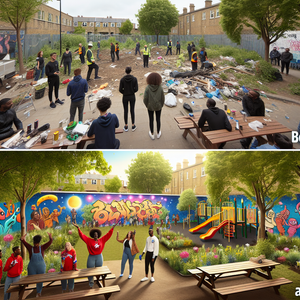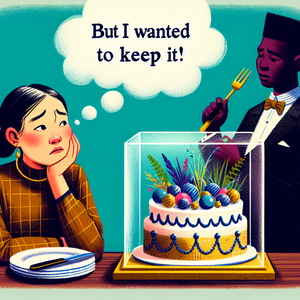The Unseen Lives of Urban Foragers

For many urban foragers, the allure lies in the thrill of discovery. The city, often perceived as a sterile environment devoid of nature, is, in fact, teeming with edible plants, fruits, and mushrooms. Forager and educator Ellen recalls her first foraging experience: "I was walking in the park and noticed these vibrant dandelion greens. I had always seen them as weeds, but when I learned they were edible, it opened my eyes to a whole new world." This moment of realization is common among foragers, who often find joy in connecting with their environment in ways they never imagined. The motivations for foraging extend beyond mere curiosity. Many urban foragers are driven by environmental concerns, seeking to live sustainably and reduce their ecological footprint. By harvesting local, wild edibles, they sidestep the industrial food system, which is often associated with high carbon emissions and unsustainable practices. Forager Mark notes, "When I forage, I know where my food comes from. I can trust that it hasn’t traveled thousands of miles to reach my plate." This perspective underscores a broader trend towards local and sustainable food systems, where individuals take back control over their food sources.
Navigating Challenges and Risks
However, urban foraging is not without its challenges. Foragers face various obstacles, including legal restrictions, safety concerns, and the need for knowledge about local flora. In many cities, foraging in public parks is either discouraged or outright illegal, creating a complex relationship between foragers and local authorities. "We are often seen as trespassers," Ellen explains. "But we are just trying to connect with nature and share its abundance with others." This tension highlights the need for greater awareness and dialogue between foragers and city planners. Safety is another critical consideration. Foragers must be well-versed in plant identification to avoid toxic species. Online communities and local workshops have emerged to address this concern, providing resources and shared knowledge. For example, groups like the Urban Forage Collective offer classes that teach participants how to identify, harvest, and prepare wild edibles safely. These educational efforts not only promote safety but also empower individuals to embrace foraging as a legitimate and enriching practice.
Community and Connection
Urban foraging is also about community. Many foragers find that the practice fosters connections with like-minded individuals. Community foraging events and educational workshops not only create opportunities for learning but also serve as social gatherings where participants share stories, recipes, and experiences. "Foraging has brought me closer to my neighbors," Mark shares. "We exchange tips, and sometimes we even cook together. It’s a beautiful way to build community." This sense of camaraderie is vital in urban settings, where social isolation can be prevalent. Moreover, foraging can be an act of resistance against the disconnect prevalent in urban living. In a world dominated by digital interactions and fast-paced lifestyles, foragers often seek to slow down and appreciate the simple pleasures of life. As Ellen emphasizes, "Foraging reminds us to take a moment, look around, and appreciate what nature provides. It’s a form of mindfulness." This practice not only enhances individual well-being but also encourages a collective consciousness about environmental stewardship and sustainability.
The unseen lives of urban foragers reveal a vibrant subculture that challenges the conventional perception of city life. By harnessing the natural bounty around them, these individuals not only nourish themselves but also advocate for sustainability, community engagement, and a deeper connection to nature. As urban spaces continue to evolve, the practice of foraging serves as a reminder of the resilience of nature and the importance of fostering a harmonious relationship with our environment. In a world that often prioritizes convenience over connection, urban foragers are leading the way in reclaiming the joy of gathering food from the wild, one city street at a time. Their stories inspire a reawakening of our relationship with the natural world and encourage us to look beyond the concrete to find the vibrant life that thrives even in the most unexpected places.
Urban Agriculture Specialist
Local governments, non-profit organizations, community farms, educational institutions
Responsibilities
Develop and implement urban agriculture programs that promote sustainable food practices in cities.
Collaborate with community organizations to educate residents about local edible plants and foraging techniques.
Conduct workshops and hands-on training sessions on urban gardening and foraging.
Required Skills
Strong understanding of horticulture, botany, and sustainable agriculture practices.
Excellent communication and community engagement skills.
Experience with program development and project management.
Environmental Educator
Nature centers, schools, environmental non-profits, community organizations
Responsibilities
Design and deliver educational programs focused on urban ecology, foraging, and sustainability.
Facilitate community outreach initiatives and workshops to raise awareness about local flora and fauna.
Create educational materials and resources for diverse audiences, including schools and community groups.
Required Skills
Background in environmental science, education, or related fields.
Proficient in public speaking and curriculum development.
Ability to engage with a variety of audiences and tailor content to meet their needs.
Foraging Guide
Eco-tourism companies, educational organizations, independent foraging businesses
Responsibilities
Lead foraging tours in urban areas, teaching participants about wild edibles and their uses.
Ensure participant safety by providing instruction on plant identification and sustainable harvesting practices.
Share knowledge about the ecological significance of urban foraging and local biodiversity.
Required Skills
In-depth knowledge of local edible plants, mushrooms, and foraging laws.
Strong interpersonal skills to engage and educate participants effectively.
Experience in outdoor leadership or guiding.
Community Organizer for Food Justice
Non-profit organizations, social justice advocacy groups, local government agencies
Responsibilities
Advocate for policies that support urban foraging and sustainable food systems within city planning.
Mobilize community members to participate in local food initiatives and foraging events.
Collaborate with local governments and organizations to create inclusive access to foraged foods.
Required Skills
Strong understanding of food justice issues and urban agriculture.
Excellent networking and relationship-building abilities.
Experience in grassroots organizing and community engagement.
Culinary Herbalist
Restaurants, wellness centers, cooking schools, private culinary businesses
Responsibilities
Create recipes and culinary applications using foraged ingredients and local herbs.
Educate clients and the community about the nutritional and medicinal benefits of wild edibles.
Host workshops and cooking classes focused on foraging and preparing foraged foods.
Required Skills
Culinary training with a focus on herbs and wild edibles.
Experience in nutrition and herbal medicine.
Strong creativity and passion for cooking with natural ingredients.


